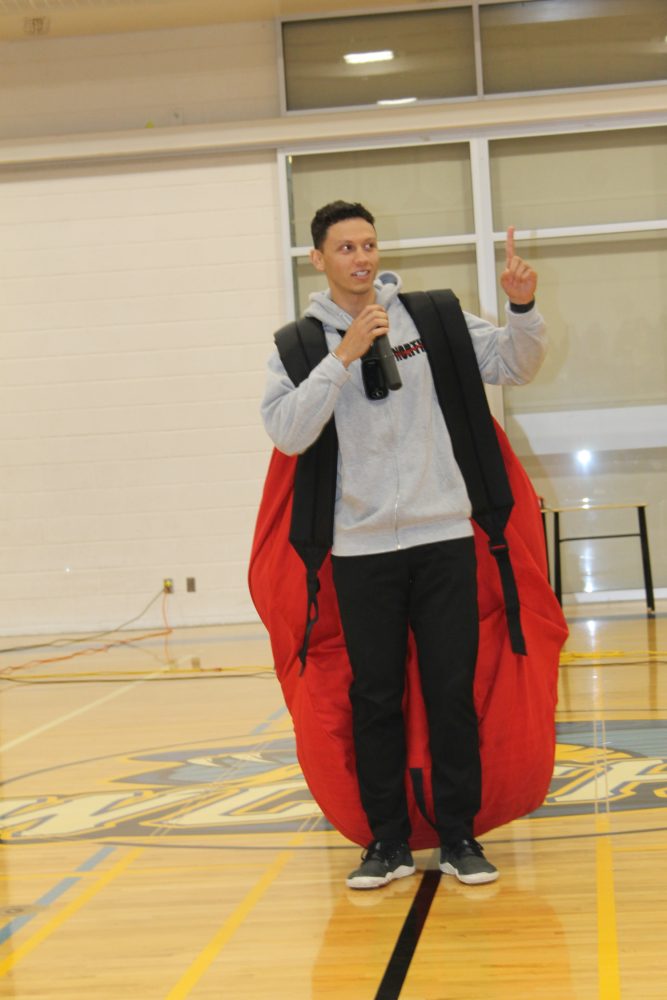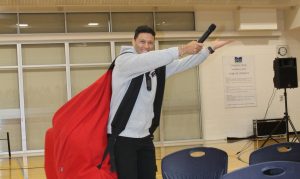Speaker tells students others don’t define them
By Rob Vogt
Everyone carries a backpack with them full of their own experiences, and no one knows what is in another’s backpack.
That was the message guest speaker Sam Demma brought to students at Willow Creek Composite High School on Friday, Sept. 20.
They were also joined by a busload of students from Livingstone School in Lundbreck.
Demma opened by sharing a story.
He was talking to a student on Instagram. That student’s goal was to have 50,000 followers on TikTok.
Demma asked him why.
“Sam,” he responded. “If I had 50,000 followers, kids at school would stop bullying me.”
At that moment, the student went silent.
There were about 30 others on the call. Suddenly, they filled the screen with positive comments.
The student came back on, and Demma was able to connect him with the guidance counsellor at the student’s school and additional resources.
Demma said the words he wanted to say to that student came a few minutes after that conversation.
He wanted to tell that student people’s negative words about you don’t have to define your self worth.
“He had the ability to empty his backpack,” Demma said.
He explained everyone has a backpack strapped to them from the day they were born to the day they die.
As they go through life, experiences that shape their beliefs go into that backpack.
The goals of his presentation were simple.
One was to identify the stories to empty in that backpack.
Another was to realize everyone has one, and no one else truly knows what is in it. So it is important to treat each other with kindness and respect.
Demma then shared an experience he had on a trip to South America.
He was at a dance, and decided to ask someone to dance. She turned away from him and grabbed someone else to dance.
Demma went back to his room and wrote a plan. He was going to learn to dance, and he was not going to leave success entirely in someone else’s hands.
Instead, everyone has to be accountable for their choices.
Consequently, the next day he practised dancing first to a video on YouTube, then with his sister.
That night, Demma returned to the dance.
He said in our lives we can’t control the outcomes, but we can control the inputs by making the right choices.
The only person he saw not dancing was the same girl from the night before.
The day before he had made a promise to himself that he was going to dance that night, noting people keep promises with others but break promises they make to themselves.
Demma said the first way to empty your backpack is by following through on your commitments.
So, he locked eyes with the girl, and she turned to stare at the wall. Demma walked to the wall, and got within an arm’s length of her.He had learned the Spanish word for teach, and asked her to teach him to dance. She got excited and not only taught him to dance, but danced with him the next five nights straight.
Before that, Demma had this belief in his backpack that he couldn’t dance.
“It’s time we empty those opinions from our backpacks,” he said.
Demma revealed a tattoo he has of an upside down backpack, symbolizing how you can’t keep stuff in it when it’s upside down.
One of Demma’s dreams in his backpack was to do an event in front of 20,000 people in five years.
His friend Lucas asked why five and not three years?
“We all need friends who believe in us more than we believe in ourselves,” Demma said.
He added the second way to empty your backpack is getting rid of negative associations.
Another belief Demma had in his backpack was he wanted to be a professional soccer player.
He moved to Europe for six months to train with the goal of signing a pro contract.
He built relationships there he remembered.
Demma said courage is not carrying a challenge alone. Do not stop yourself from reaching out to others.
He also said if every choice you make helps people feel good, helps others, and helps them empty their backpacks, that’s good.
Demma then returned home and went back to high school.
“If we don’t change our choices, nothing changes,” he said. “Because we can change, everything else can change.”
Life started changing for Demma in Grade 12.
He was offered a full scholarship to play soccer at Memphis University. The coach just wanted to see him play in a high-pressure environment.
That would be the Disney Cup. Demma’s team was participating, and college scouts would be everywhere.
Days before he was set to leave, Demma was injured in practice. He would not need knee surgery, and four to six months of recovery.
Demma had always been the hardest working and held everyone accountable, so he flew to Florida for the Disney Cup, and watched all his teammates get scholarship offers.
He would return home, and get injured again, and again.
Demma said no one else knew he was struggling because he was always the one who fixed everything.
“We have no idea what other human beings are carrying on their shoulders,” he said.
Demma stressed to everyone to not do anything that adds to another person’s backpack.
At that point in life, he also had some amazing role models.
One was a teacher who taught him small, consistent actions can change the world.
Two weeks later, Demma picked up a coffee cup off the ground. He thought maybe his first small action would be picking up trash every day on the way to school.
He did that for months when, one day, his best friend saw him doing it. He pulled over. Not only did he want to do that with Demma, but asked why not get others involved at the school.
By the end of the month they had a list of 700 people, with 30 to 40 every month picking up trash. They did more than 350 community clean-ups and gathered more than 3,000 bags of trash.
Demma asked what is a small, consistent action you can do to empty your backpack? It is not about you, but about others.
He then told the story of his friend Andrew.
When the pandemic hit, Demma started calling to check in on his friends.
He called Andrew who was still in bed at 2 p.m.
Demma thought he would cheer him up, so he went on social media, found out Andrew likes tacos, and sent an order of tacos for him and his wife.
Less than a minute after the food arrived. Andrew Facetimed Demma.
He was crying, and it had nothing to do with food.
Demma had given Andrew hope. You see, he had to shut down his business, lay off his staff, and was not sure what he was going to do.
“For me and my wife,” Andrew told Demma. “It is a moment of hope I will remember the rest of my life.”
Demma said one of the most meaningful actions of life is being of service to others.
He concluded by encouraging students when they feel stuck to ask what small, consistent actions they can take, and keep their promises
“Keep your backpack empty and your imagination full,” he said.


